Let $a, b , c, d$ be reals. Define the sequence $(x_n)$ as:
$$x_0 = a,\,\, x_1 = b$$ $$x_n = \left(1 - \frac{b^2}{n^2}\right)x_{n-1} + \frac{1}{n-1}\sum_{k=0}^{n-2}\binom{2n+1}{2k+1}^{-1} (x_{k+1}-x_k)(c\, x_{n-k-1}- d\, x_{n-k-2}),\,\,\, n \geq2.$$ I
I'm actually studying the asymptotic series of a solution of some nonlinear differential equation, where $(-1)^n(2n+1)!x_n$ represent the coefficients of such series. I want to prove that $(x_n)$ is convergent. Here are two examples for different values of $(a, b , c, d).$
It seems (after several numerical tests) that the sequence is bounded and monotone from specific $n_0.$ The boundness of the sequence imply that $$\sum_{k=0}^{n-2}\binom{2n+1}{2k+1}^{-1} (x_{k+1}-x_k)(c\, x_{n-k-1}- d\, x_{n-k-2})$$ is bounded and the term with the sum goes to zero.
Thank you for any hint


